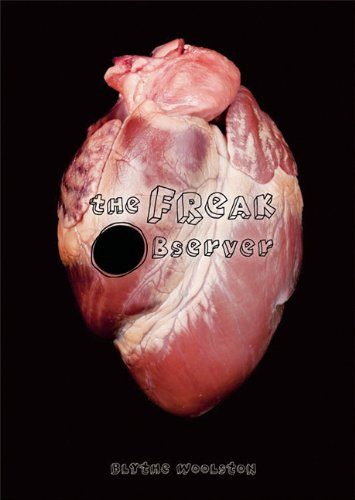The Freak Observer is better than vodka

I’ve wanted to read The Freak Observer ever since I first heard about it (even before it won the prestigious Morris award). I mean, who wouldn’t want to read a book “about death, life, astrophysics, and finding beauty in chaos”?
Now that I’ve read The Freak Observer, I can see that folks aren’t kidding when they talk about the amazing, distinctive voice of Loa, the protagonist. Although in some ways her world is very different (rural, white) from the one I write about in What Can’t Wait (urban, mostly Hispanic), Loa and Marisa (my protag) would have plenty to talk about.
Loa is a bit more cynical and a bit more wounded than Marisa, but they both know what it means to be critical caregivers for younger siblings, contributors to family finances, and wallpaper to the lives of those around them. Marisa would relate to another gal who thinks things like, “The only time I look in the mirror on purpose is when I brush my teeth” (90). This bit is like something from Marisa’s world, too:
“Mom would sit at the kitchen table with the checkbook, a piece of scratch paper, and any bills that were waiting to be paid. It is one thing to be good at theoretical math; it’s another thing, probably better, to be able to figure out how to skate from one week to the next without pissing anybody off or getting stuck in the Payday-Cash-Now-Check-Into-Cash hamster wheel of economic hell” (98).
Another thing I liked about the book was how changes in Loa’s parents’ lives (like her mom going back to college) forced Loa to rethink her own notions of who she was. This reminded me a bit of the protag in Laurie Halse Anderson’s Catalyst. Loa thinks of herself as the one who keeps things running, the one who doesn’t fall apart. The idea that her parents aren’t locked into the dead-end path that she thought they were sort of shakes her up. This is classic Loa:
“We don’t accept welfare, we don’t buy shit on credit, and we don’t eat anything with paws. I though those were the rock-hard truths about this family, about who we are, but I may need to fiddle with the focus a little more. “We” may not be exactly who I thought. And that leaves ‘Me’ a little fuzzy around the edges (154).
Oh, and The Freak Observer gets bonus points in my book for the following passage:
“I try not to remember what they looked like, the skeleton puppets in brown dresses. I am not successful. It is very hard not to remember something. It’s easy to forget but very hard not to remember on purpose… I know that I can’t choose not to remember. I can’t choose the slide show in my imagination. I can practically hear my own neurons laughing at me. The little shits” (147).
Why the bonus points? I mean, aside from the awesome voice, which reminds me of a younger version of my best writing buddy (who also happens to be the funniest pessimist in the world)? The bonus points are because here’s a YA novel featuring something that actually relates to my own academic work. Because Loa is basically describing the shortcoming I see in a recent debate over this idea called “imaginative resistance.” But that’s sort of technical and boring, so I will save it for a post where I can figure out how to make the topic riveting.
The Freak Observer isn’t a plot-driven book, but it is a page-turner. Loa’s description of a collection of photography actually applies nicely to the book itself. The subject of these pictures was seeing… They were about looking and seeing…I just want to keep looking at pictures, swallowing up other people’s visions. It is better than vodka” (88).
The Freak Observer is better than vodka. Now go read it.
For more visions you’ll want to swallow up, check out Blythe Woolston’s blog.




